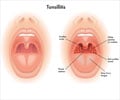A team of researchers has revealed that twenty percent of adults who have tonsillectomies will have a complication.

According to Scanlon, the team's study is the first of its kind to examine a large adult population, across institutions and provider practices and over multiple years using the Truven Health MarketScan Database. Previous studies focused on small numbers of patients within particular institutions and have not considered a wider spectrum of complications beyond post-tonsillectomy hemorrhage. To conduct its study, the team, which also included researchers from the Kaiser San Francisco Medical Center and Truven Health Analytics, examined data from 36,210 adult tonsillectomy patients. The results will appear in the April 2014 issue of Otolaryngology -- Head and Neck Surgery. The findings suggest that of adult patients who have undergone a tonsillectomy, 20 percent had a complication, 10 percent visited an emergency room, and approximately 1.5 percent were admitted to a hospital within 14 days of the procedure. Six percent of adult patients were treated for postoperative hemorrhage; 2 percent were treated for dehydration; and 11 percent were treated for ear, nose or throat pain within 14 days of surgery.
"These estimated complication rates are significantly higher than those reported in prior studies," Scanlon said. The researchers also investigated expenditures associated with adult tonsillectomies and found that, on average, the amount paid for a tonsillectomy without complication was $3,832 whereas tonsillectomy with hemorrhage resulted in an average expenditure of $6,388. "Our results highlight the challenges patients face when making informed decisions about medical and surgical treatments, as well as the excess costs and harm incurred due to complications," Scanlon said. "Patients expect to compare the risks and benefits of treatment options, but as our study shows, credible patient-centered information is often lacking, even for a common procedure that has been in practice for many, many years. The availability of important risk and benefit information should be expedited, and providers need to be trained to engage patients in how to use this information to make informed choices.
Source-Eurekalert









